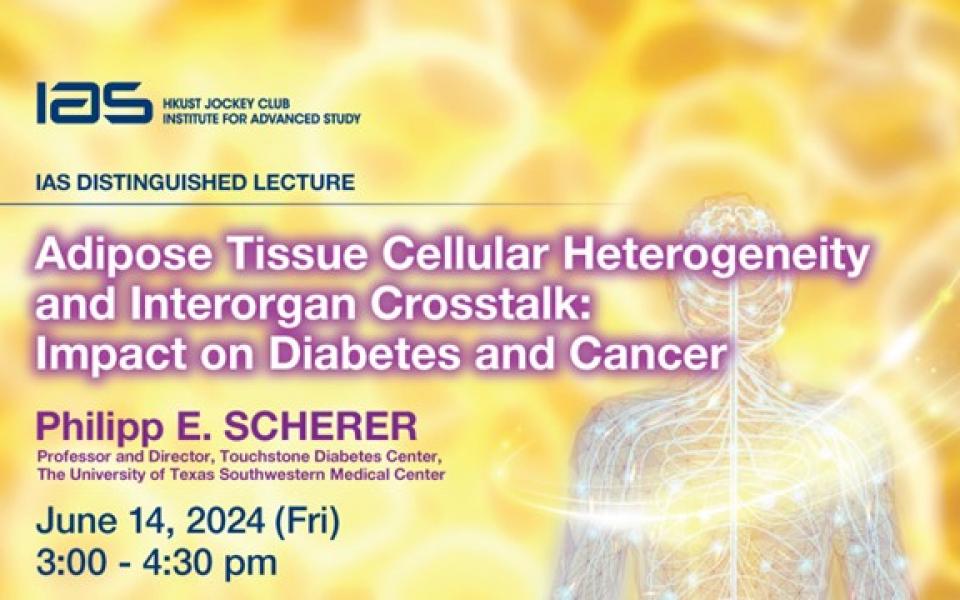IAS Distinguished Lecture - Adipose Tissue Cellular Heterogeneity and Interorgan Crosstalk: Impact on Diabetes and Cancer
Abstract
A number of different cell types contribute to the cellular architecture of fat tissue. While the fat cell is making important functional contributions to the systemic metabolic well-being, several additional cell types contribute a supportive role to bestow maximal flexibility on the tissue with respect to many biosynthetic and catabolic processes. The adipocyte has morphed into a cell type whose complexity we only start to appreciate. We now understand that: 1) the contributions of the adipocytes depend on their location, e.g. visceral vs. subcutaneous location. In fact, there are many more distinct fat pads in the body that act as “miniorgans” that play major roles in their local microenvironment; 2) we have different types of fat cells, some of them geared for energy storage (white adipocytes), some of them geared towards energy and heat generation (beige or brown adipocytes); under some physiological conditions, adipocytes can de-differentiate into (myo)fibroblasts and adipocyte precursor cells; 3) the ability to store excess calories and thereby acting as an anti-lipotoxic tissue is a key role for adipose tissue; 4) adipocytes produce hormones and other signaling molecules that integrate the systemic energy reserves and convey that to the brain and other organs; these adipokines should not be judged in isolation but rather be looked upon as a carefully orchestrated group of multiple different components that act in concert; Understanding the mutual influence of adipokines on each other is an essential part of understanding the endocrinology of the fat cell.
About the Speaker
Prof. Philipp E. SCHERER is currently Professor and Director of the Touchstone Diabetes Center at the University of Texas Southwestern Medical Center in Dallas. Current efforts in his laboratory are focused on the integrative physiology of the adipocyte and the impact on whole body energy homeostasis, inflammation, aging and cancer. He has had a longstanding interest in adipocyte-derived factors (adipokines) and adipocyte physiology. As such, he has focused on adipose tissue and on the cells that adipose tissue-derived factors target, such as hepatocytes and cells of the cardiovascular system. The lab is approaching these questions with a multipronged approach that includes cell biological and biochemical approaches as well as the use of mouse genetics, with the ultimate goal to apply the findings to clinical questions related to diabetes, its pathological sequelae, such as cardiovascular disease and hypertension.
In 2005 Prof. Scherer was awarded the American Diabetes Association’s Outstanding Scientific Achievement Award (The “Lilly Award”) for his team’s work in establishing the endocrine functions of the adipocyte. In 2012, he received the O’Donnell Award in Medicine from The Academy of Medicine, Engin. & Science of Texas, the highest honor for medical research in Texas, and in 2015, he received the Banting Medal of the American Diabetes Association, the 2017 EASD Novo Nordisk Foundation Diabetes Prize for Excellence, the 2019 Basic and Translational Science Award, International Diabetes Federation (IDF) and the 2022 Society for Endocrinology Transatlantic Medal (United Kingdom). Prof. Scherer has served as a member and as Chair of the Endocrinology, Metabolism, Nutrition, and Reproductive Sciences ZRG F06 (20) study section for NIH (pre- and post-doctoral training awards), served on several ad hoc study sections and was a permanent member of the Integrative Physiology of Obesity and Diabetes IRG, which he chaired from 2009-2011. He was the organizer or co-organizer of a number of meetings, including the following: Board Member, Kern Aspen Lipid Conference 2013-present; Co-organizer Kern Lipid Conference 2016, 2022; Co-organizer Keystone Meeting on “Obesity/Adipose Tissue Biology”; 2016 and 2018; Deuel Lipid Conference Advisory Board 2020-present; he has trained more than 40 PhD, MD-PhD and post-doctoral scientists, many of which now hold faculty positions. He has been an integral part of multiple Training Grants while at Albert Einstein and now at UT Southwestern Medical Center, and has served as the PI for the Endocrine and Metabolism Training Grant at UTSW for the past 12 years. He has successfully mentored many K99, K08 and K01 awardees as well as F30, F31 and F32 awardees in the past.
For Attendees' Attention
Seating is on a first come, first served basis.
